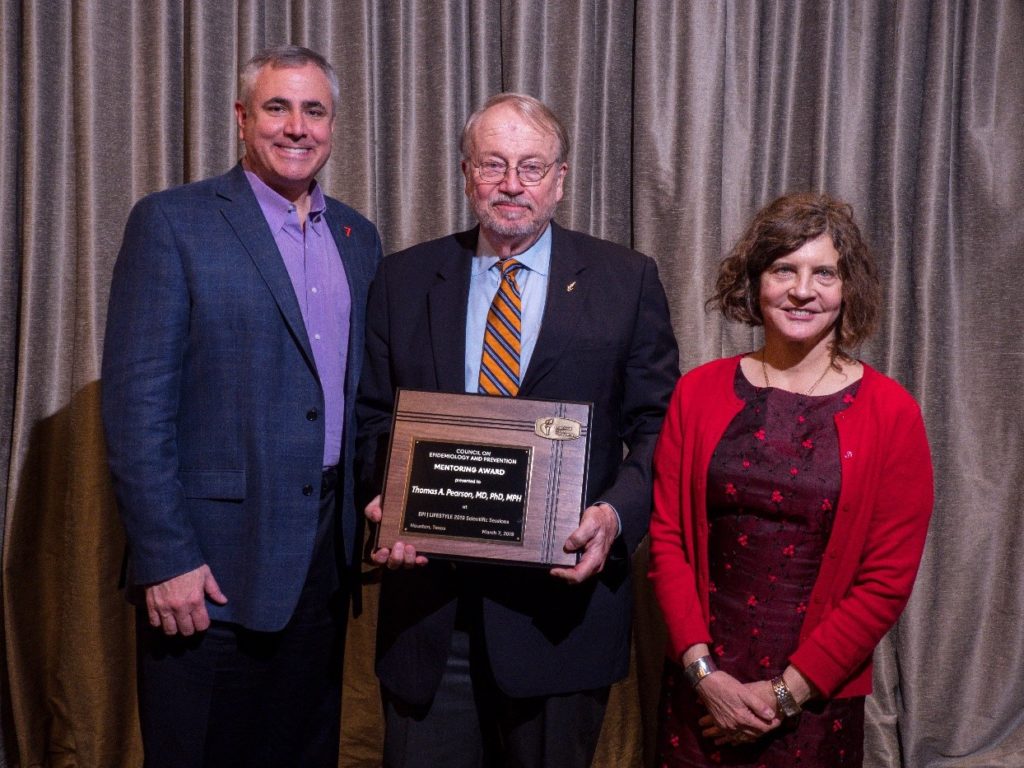Every scientist, even those who are particularly good at hiding away in their offices, will have an impact on others. Most of the time, this impact is a byproduct of our everyday work. We don’t give it much thought – it just happens. But what if that impact was not accidental, and instead was a deliberate, strategic path of choices that build up those around us – even those who disagree with us, compete with us, and threaten us? That is the path that has been trodden by Dr. Thomas Pearson who was awarded the 2019 AHA Council on Epidemiology and Prevention Mentoring Award.
Dr. Pearson has an impeccable academic pedigree and an enviable career. After an early start at the University of Wisconsin, he earned his Bachelor of Arts, MD, MPH, and PhD all from the Johns Hopkins University. He has achieved the goal of every early career scientist – over 35 years of continuous NIH support and is a Fellow of the American Heart Association, American College of Cardiology, the American College of Preventive Medicine, and the American College of Physicians. But the degrees, grants, and accolades are a byproduct of a man driven to service for the love of science.
 Dr. Pearson’s own mentors reflected his insatiable curiosity. As a student, he drew from a broad mentoring team that left lifelong impressions of the qualities of good mentor. While excellent teaching was important, more so was the “utterly frank” assessment and advice they provided him. He states, “from them I learned that the primary role of a mentor is to provide an honest, encouraging perspective on the mentee’s ideas, plans and experiences. While some mentors may be tempted to acquiesce or tell mentees what they want to hear- that is abrogation of their responsibility of a mentor.” Such frankness can be tough in today’s academic environment, so to help cultivate this skill, Dr. Pearson’s University of Florida developed the Mentorship Academy. Equally important to learning how to deliver a frank assessment of the mentee is helping the mentee learn how to receive and act upon such advice without taking umbrage to it.
Dr. Pearson’s own mentors reflected his insatiable curiosity. As a student, he drew from a broad mentoring team that left lifelong impressions of the qualities of good mentor. While excellent teaching was important, more so was the “utterly frank” assessment and advice they provided him. He states, “from them I learned that the primary role of a mentor is to provide an honest, encouraging perspective on the mentee’s ideas, plans and experiences. While some mentors may be tempted to acquiesce or tell mentees what they want to hear- that is abrogation of their responsibility of a mentor.” Such frankness can be tough in today’s academic environment, so to help cultivate this skill, Dr. Pearson’s University of Florida developed the Mentorship Academy. Equally important to learning how to deliver a frank assessment of the mentee is helping the mentee learn how to receive and act upon such advice without taking umbrage to it.
Additionally, Dr. Pearson offered this advice on how early stage professionals can intentionally become effective mentors, including:
- Be a good communicator. Communication is the basis of mentoring. Good communication should include developing shared expectations of the goals, responsibilities, and processes of the mentor-mentee relationship. Many of the problems that occur in the mentoring relationship result from a misalignment of expectations and reality. An honest conversation, with both parties being active listeners, about the mentor and mentee’s strengths, weaknesses and goals early on in the relationship can set both parties up for success.
- Broaden your network. Every day we hear about new grants, interesting conferences, and visiting professors. Yet because they are just starting their career, mentees may not hear about the same opportunities. Part of being a good mentor, Dr. Pearson suggests, “is to continually be looking out for opportunities for your mentee and actively encouraging them to pursue them”. This includes inviting a mentee to a lecture and offering to introduce her to the speaker. Opening this door can help a mentee broaden her professional network and embolden her to pursue new opportunities.
- Focus on the mentee. The mentor must recognize the mentee is not “hers.” Rather the mentor should focus on the mentee’s needs and goals and, if she finds another investigator can provide a better opportunity for the mentee, help to arrange it. Dr. Pearson states, “Mentoring and selfishness are like oil and water- they don’t mix.”
- Stay curious. In his acceptance speech, Dr. Pearson talked about how much he learned from each of his mentees. They taught and inspired him as much as he did them. But that can only happen by accepting that mentoring is a partnership in which each person has a lot to offer. Good mentors need to be curious about their mentees and excited about learning from them.
Dr. Pearson has mentored over 60 people during his career. Many have gone to have equally enviable careers where their impact reverberates into every corner of our profession. He told me, “You never really stop mentoring a mentee. People I mentored still call me and talk about their career, their family. At some point, they start being friends.”
Mentors – true mentors – view their work not as a requisite service but as a thread that weaves together the knowledge of the current and past generations to the next. Mentors are the foundation upon which scientific progress is made; and their impact is the greatest when their mentoring is done with humility, enthusiasm, compassion, curiosity, and an infallible sense of optimism. These are the traits Dr. Pearson embodies; and are the ones that all who seek to see further should strive to emulate.